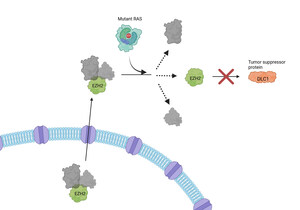BETHESDA, Md., Sept. 28, 2015 /PRNewswire-USNewswire/ -- Editor's Note: The following article is part of the monthly Lifelines® education and awareness print series that the National Cancer Institute provides to African American news outlets.
Someone who is diagnosed with cancer today would typically receive treatment for their disease based on the type of cancer they have. For example, there are specific, standard treatments for patients with breast cancer or colorectal cancer or prostate cancer.
That strategy is now evolving, thanks to a new approach to medicine that is focused not on where in the body the cancer is located but on what is inside the tumor itself. And in January 2015, President Obama took up the mantle of this new approach to patient care, known as precision medicine, announcing a $215 million initiative aimed at speeding progress in this area of research.
The Precision Medicine Initiative, as it's called, is included in the President's 2016 budget proposal. Although the funding would support research that applies to a range of diseases and conditions, its initial focus will be on cancer, where the movement toward precision medicine has already taken hold, due in no small part to sustained and substantial federal funding support for cancer research. This support has enabled the National Cancer Institute (NCI) to make significant advances over the last decade in areas like genomics and the development of molecularly targeted therapies.
At its heart, as NCI acting director Dr. Doug Lowy explains, precision medicine is about tailoring prevention, diagnosis, and treatment according to the individual characteristics of each patient.
In cancer, treatment already takes into account some characteristics of each patient. Currently, for example, treatments may be based on how a specific disease presents in each patient (for example, is it only in the organ in which it started, or has it spread?), on whether the tumor is influenced by certain hormones (as may be the case in prostate and breast cancer, for example), on whether a person has other health conditions that could influence their ability to tolerate treatment, as well as on other factors. We know in some cases that the type of tumor also makes a difference. Even if a patient has a molecular abnormality associated with response to a certain drug in a different tumor, it does not necessarily mean their (different) tumor will also shrink when they are treated with the same drug. We now have the tools to try to begin to discern in which tumors a good response is more likely.
Precision medicine goes several steps further. In cancer, for instance, factors such as where in the body a cancer originated may become less important than the molecular alterations – changes occurring in a person's genes - that are thought to be driving the growth of a tumor. There are several cancer drugs being used today, and several more under development, that are specifically designed to target and kill cells that have those mutations.
Following this approach, a patient with breast cancer and a patient with stomach cancer may be candidates for the same treatment, if an analysis of their tumors shows that the same molecular alteration is fueling their cancer.
Precision medicine can also be applied to prevention and screening for early signs of cancer, Dr. Lowy says. "Precision medicine is being used now in screening for cervical cancer," he explains. Virtually all cases of cervical cancer are caused by infection with the human papillomavirus, or HPV. And, based on results from a number of studies, Dr. Lowy continues, "we are now seeing the transition from the traditional Pap test for cervical cancer screening to tests that look for the presence of HPV, which the studies have shown can be even more effective at reducing the number of women diagnosed with cervical cancer."
In the African American community, precision medicine holds promise in accelerating progress toward eliminating cancer disparities. Cancer has had a more profound impact on the African American community than any other U.S. racial/ethnic group in terms of the percentage of cases and deaths from cancer.
Although factors such as access to care play an important role in such disparities, some studies have also suggested that part of this disparity may be tied to biological factors, including cancer-inducing molecular alterations that may be more commonly seen in African Americans than in other racial/ethnic groups. As more therapies that can specifically target these molecular drivers of cancer are developed, it may mean that more African Americans will have access to more-effective treatments.
The cancer research community recently took a major step forward in making precision medicine a reality for more people. Earlier this summer, NCI launched a cutting-edge nationwide clinical trial called NCI-MATCH. In this clinical trial, researchers are analyzing patients' tumors to determine whether they contain specific molecular abnormalities for which a targeted therapy exists and assigning treatments based on the abnormality, rather than their cancer type.
The trial opened in August 2015 to adults age 18 and older with advanced solid tumors and lymphomas that are no longer responding (or that never responded) to standard treatment and have begun to grow. NCI-MATCH is open to patients at hospitals and clinics around the country, meaning that patients may not need to travel far from home to enroll in the trial.
This clinical trial and other precision medicine initiatives are helping NCI researchers learn how effective precision medicine treatments can be in patients with a variety of cancer types and from a wide range of ages and racial and ethnic backgrounds. Precision medicine holds the potential to transform cancer care and reduce the gap we have today in cancer disparities, says Dr. Lowy.
For more information about precision medicine and cancer visit http://www.cancer.gov/research/key-initiatives/precision-medicine
NCI leads the National Cancer Program and the NIH effort to dramatically reduce the burden of cancer and improve the lives of cancer patients and their families, through research into prevention and cancer biology, the development of new interventions, and the training and mentoring of new researchers. For more information about cancer, please visit the NCI web site at www.cancer.gov (or m.cancer.gov from your mobile device) or call NCI's Cancer Information Service at 1-800-4-CANCER (1-800-422-6237). More articles and videos in the culturally relevant Lifelines series are available at www.cancer.gov/lifelines.
Logo - http://photos.prnewswire.com/prnh/20111018/DC89117LOGO
SOURCE National Cancer Institute
Related Links
WANT YOUR COMPANY'S NEWS FEATURED ON PRNEWSWIRE.COM?
Newsrooms &
Influencers
Digital Media
Outlets
Journalists
Opted In






Share this article